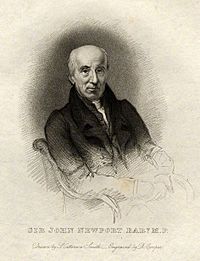Sir John Newport, 1st Baronet facts for kids
Quick facts for kids
Sir John Newport
|
|
|---|---|
 |
|
| Chancellor of the Exchequer of Ireland | |
| In office 24 February 1806 – 30 April 1807 |
|
| Monarch | George III |
| Prime Minister | The Lord Grenville |
| Preceded by | John Foster |
| Succeeded by | John Foster |
| Comptroller General of the Exchequer | |
| In office 11 October 1834 – 18 April 1835 |
|
| Monarch | William IV |
| Preceded by | New office |
| Succeeded by | Thomas Spring Rice |
| Personal details | |
| Born | 24 October 1756 |
| Died | 9 February 1843 |
| Nationality | British |
| Political party | Whig |
| Spouse | Ellen Carew |
| Alma mater | Trinity College, Dublin |
Sir John Newport (born October 24, 1756, died February 9, 1843) was an important Anglo-Irish politician. He was a member of the Whig political group. He held a very important job: the Chancellor of the Exchequer of Ireland. This role meant he was in charge of Ireland's money and finances for the government. He was also given the special title of a Baronet, which is like a hereditary knight.
Contents
Sir John Newport's Early Life
John Newport was born on October 24, 1756. His father, Simon Newport, was a banker in a city called Waterford. John went to school at Eton College and then studied at Trinity College, Dublin. After finishing his education, he joined his father's banking business.
In 1783, he became involved in politics. He joined a group of people in Dublin who were discussing how to improve the way representatives were chosen for the government.
Political Career and Key Roles
John Newport became a baronet on August 25, 1789. This meant he was known as Sir John Newport. In 1802, he tried to become a Member of Parliament (MP) for Waterford City. He didn't win at first, but later, in 1803, he successfully challenged the election results and became the MP. He continued to represent Waterford until he retired from politics in 1832.
In 1806, Sir John Newport was given a very important job. He became the Chancellor of the Exchequer of Ireland. This meant he was the main person in charge of Ireland's government money. He also became a member of the English Privy Council, which is a group of important advisors to the King. He presented Ireland's budget (plans for spending money) twice during his time as Chancellor. He left this role in 1807.
Sir John Newport was known for not agreeing to join a government led by Lord Liverpool. This was because that government did not support "Catholic emancipation." This was a movement to give Roman Catholics more rights in society and politics.
Speaking Out and Later Years
Sir John Newport was also known for speaking out against the removal of the Elgin Marbles from Athens. These were ancient sculptures taken from the Parthenon in Greece. He believed it was wrong to take them. He said that it was "the most flagrant pillages" (a very bad theft).
He gave his last speech in the House of Commons (part of the British Parliament) in 1832. In 1834, he was given a new job as the Comptroller General of the Exchequer. This role involved overseeing government spending. He retired in 1839 and passed away on February 9, 1843, near Waterford. He was buried in Waterford Cathedral. Because he was very determined in his investigations in Parliament, people sometimes called him the "Political Ferret."
Family Life
Sir John Newport married a woman named Ellen Carew. They did not have any children. When Sir John Newport died, his nephew, also named John Newport, became the 2nd Baronet. However, when his nephew died in 1859, the title of baronet ended.
 | Bessie Coleman |
 | Spann Watson |
 | Jill E. Brown |
 | Sherman W. White |

